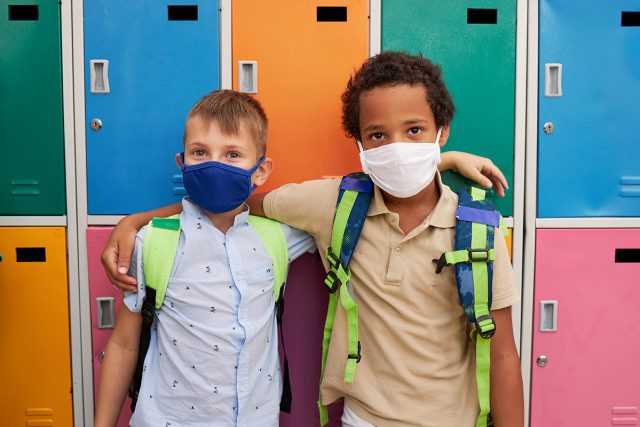UAB News
While children are much less likely than adults to have problems from a COVID-19 infection, COVID is still the 10th-leading cause of pediatric deaths, according to the Centers for Disease Control’s Advisory Committee on Immunization Practices. Now, more than ever, is the time for parents to start the conversation with their children about receiving the COVID vaccine.
With the whirlwind of new information daily, children may feel overwhelmed and unsure of what to think about the vaccine. Candice Dye, M.D., pediatrician in the University of Alabama at Birmingham Pediatric Primary Care Clinic, explains how parents can help their children understand the importance of the vaccines.
Let them lead the conversation
Dye encourages parents to let their children lead the conversation. Ask them about their questions and concerns. Allowing children to steer the conversation lets parents gauge what they know and what they may not fully understand.
Try incorporating their pediatrician into the conversation as they provide valuable, fact-based information from a third-party viewpoint. Dye stresses to try not to be too scientific in these conversations to prevent further confusion or lose the children’s attention.
It is important for parents to keep an ongoing discussion about COVID and vaccines with their children. Misinformation, whether from online sources or from their peers, can add to children’s fear and anxiety, as well as blur the science-based facts. Dye encourages parents to always prepare with the correct, up-to-date information from reliable sources, such as the American Academy of Pediatrics and CDC websites, when having COVID-related conversations. Teach children to listen to the facts and not the local neighborhood rumors.
Explain the science
Shots are scary for many, especially children. Taking the time to explain the science behind vaccines can alleviate some fear of the unknown. Dye suggests comparing it to a safety precaution that children are already familiar with, such as wearing a helmet.
If a child wears a helmet and has a bike wreck, they may get a scratch or two, but their brain is greatly protected from serious damage. The same goes for COVID vaccines. Children who receive the vaccine might still contract the virus, but they will not be severely sick. The vaccines can keep them out of the hospital or worse situations.
Dye also advises parents to be honest about the potential side effects of the shot. A common side effect is a sore arm for a day or two. Let children know this will not last long, and they can take ibuprofen or acetaminophen to reduce the soreness.
One misconception about the vaccine is that it gives people the infection, which causes other symptoms such as headache, fatigue and low-grade fever. Parents should address this with the truth: Vaccines do not give people infections. These reactions are their body mounting a response and making antibodies. The antibodies provide protection and immunity should they be infected with the virus in the future.
Emphasize the importance
After a year of canceled events, restricted activities and online schooling, children finally have a chance to return to normalcy. As more of the United States’ population has become vaccinated, the CDC has loosened several guidelines for fully vaccinated individuals. Dye suggests using this as an example of the benefits of being vaccinated. Children want to experience their pre-pandemic lives again, and vaccinations are an important step toward that goal.
Additionally, many families have children of all ages; some are eligible for the vaccine, and some are not. Trials have begun for children under 12, but it will be several months before the next age group will be able to receive the shot. Dye suggests having conversations with older siblings that getting vaccinated is a way for them to protect their younger siblings who cannot yet protect themselves.
Ultimately, COVID vaccines are there to protect not only children, but their parents, grandparents, teachers, immunocompromised friends and people they interact with on a daily basis. Dye stresses the importance of putting it into perspective that getting vaccinated is a way for children to actively protect themselves and their loved ones, as well as support their community.
UAB Medicine is now providing COVID-19 vaccinations for children age 12 and up. Vaccinations are available by appointment or walk-up. To find a current vaccination site, visit UABMedicineVaccine.org.




